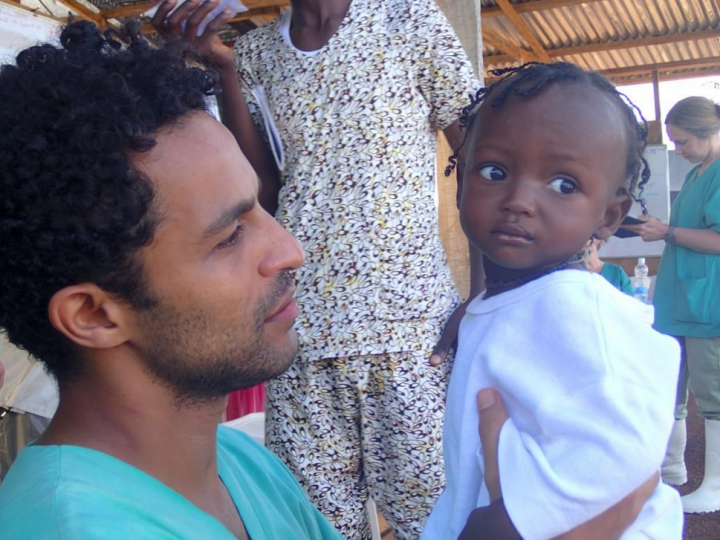
29 May2015

share

British A&E doctor Javid Abdelmoneim, 35, spent a month in Sierra Leone treating victims of Ebola, recording his experiences on specially designed goggle cameras for BBC One’s Panorama programme.
To view the original article on the BBC click here
With children, you remember the ones who survive. You almost never remember the children who died. I guess it is a way of coping.
I’d been procrastinating all summer about going to West Africa. When I got an email from the medical charity Medecins Sans Frontieres saying: “We’re desperate,” it was the nudge I needed.
They confirmed it at 17:30 BST on Friday, and I left for Sierra Leone on the Monday, arriving in Kailahun, in the remote east of the country, later that week.
I was expecting to witness a great deal of suffering. But you can never fully prepare yourself for the moment when you open an ambulance door and a dead body rolls out, or for watching half of your patients die.
As a doctor, you have to recognise that working in an Ebola epidemic is completely different from how you’d usually practise. You know that you can’t save every patient’s life, but at least you can make sure that they have a painless death.
Three or four of my patients died very sudden, shocking deaths. One man died on a Friday afternoon, fully dressed and prostrated in the Muslim prayer position, facing east.
He had the strength to do his ablutions and kneel in prayer, and then he died – it was so sudden he didn’t even topple over.
There were three young men – Mohamed, Ahmed and Alfred, aged 19, 20 and 21 – just boys – who all died on the same day. Mohamed had a really long, slow demise – it took him about two weeks to die.
At the end he looked like a skeleton. And Alfred was calling for his dad, who was lying in the next tent, also dying. Three young men, bang, in one day – you have to ask yourself what’s going on.
In reflection I wonder whether I protected myself emotionally against the ones who were obviously going to die. And did I get to know the ones who would survive? Well why not? You have to get through it somehow.
Michael and Ambu, two 10-year-old boys, were the first patients I got attached to. They were so physically able and well, despite testing positive for Ebola.
They would call my name every morning as I came in, and their English was pretty good, so we would chat across the fence. They said they were brothers, but they just called each other that – everyone calls each other brother or cousin in Sierra Leone.
Then I found out that Michael’s sisters, nine-year-old Michaela and 15-year-old Mariama, were also in the Ebola treatment centre. They immediately became my favourites too.
They were special to me because they were just bundles of joy. They had lost five siblings and their father, and yet they never stopped smiling. The last time I saw them was just before I left, when I visited them in the orphanage, where they were waiting for their mother to collect them.
Dr Abdelmoneim monitored his health and temperature for 21 days after he returned to the UK
And then there were Alpha and Warrah, two one-year olds, a boy and a girl, who were being looked after by Abdul, aged six. I met them on my very first visit to the treatment centre, and I thought: “Look at this six-year-old caring for these two one-year-olds. Look at his humanity, and think of the world leaving him to do this alone.”
With one-year-olds, you have to find an informal carer from among the patients to look after them, to change their nappies, to wash them, to feed them regularly. These are things we do as a medical team, but we can’t do them very often, as staff can only enter the high-risk zone in their protective suits for an hour at a time.
So it’s good to have someone who can provide 24-hour care. Soon we found a lovely woman called Kadia who agreed to take on the role of informal carer.
One of the one-year-olds died and one of them survived – the randomness of Ebola, being orphaned, surviving or dying alone – Alpha and Warrah epitomise everything that Ebola means to me.
Watch Panorama: Ebola Frontline on BBC One at 22:35 GMT on Monday 17 November or catch it later on the BBC iPlayer.